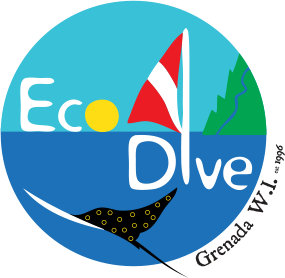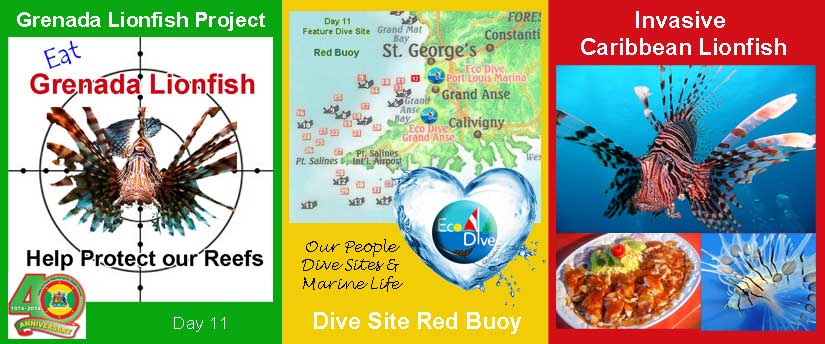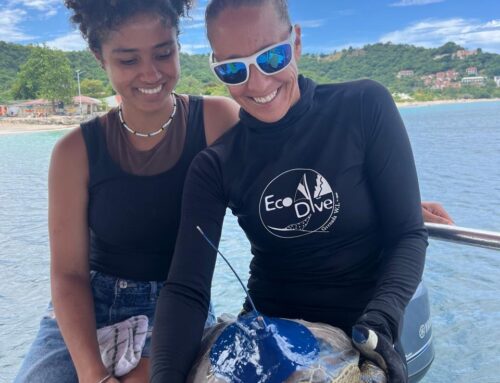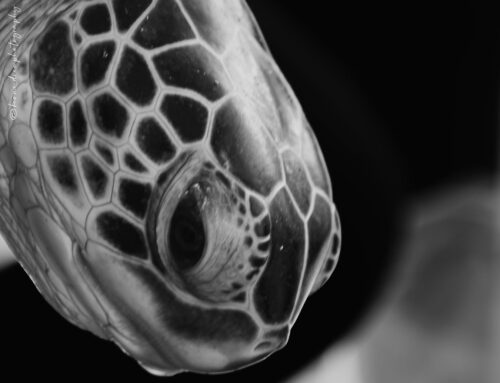Feature Creature – the Invasive Caribbean Lionfish
Power of the ‘Spice Isle Lion’
A closer look at Grenada’s invasive Lionfish and what we are doing to help. A piece written by Christine for Grenada at a Glance
Lions in Grenada? Well to the disappointment of most childrens’ imaginations and to the relief of our local Hash House Harriers, no, there are no four legged shaggy lions roaming the Grenada nature trails or waterfalls. However, as of October 2011 we now have smaller “Spice Isle Lions”, also known as invasive Caribbean Lionfish, and they are preying on our beautiful marine ecosystems.
Lionfish are stunning creatures, a long time favourite of aquarium enthusiasts around the world, and are identified by their tell-tale feathered fins and spines. These beautiful and seemingly arrogant fish have made themselves comfortable in our waters after spending the last 20 years eating their way through the Caribbean. Originally from the Pacific Ocean Lionfish arrived in the Caribbean via accidental and well-intended yet ignorant releases in Florida. As a testament to their tenacity and species success, in less than two years of ‘residency’ local biologists can already say that these lions are very well established. International scientists have also been labeling these invaders as one of the greatest threats of this century to tropical Atlantic reefs and associated habitats. Like it or not we have a reef invader that unlike our endangered species of sea turtle, sharks and rays need our attention rather than our protection. In recent times, even the not so recent times, this kill-to-protect mentality is new territory for any traditional fisheries community and a new approach for divers and snorkelers.
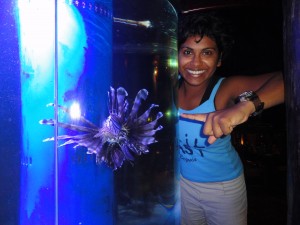
Why are Caribbean Lionfish a Problem?
- They are greedy reef predators and eat almost all species of reef fish
- Have no natural predators in the Atlantic
- They reproduce at a young age, often & by the thousands
- They can wipe out fish that are traditionally important in Grenada
- Though not aggressive Lionfish have venomous spines that can deliver a painful sting, ask for help when first handling/cleaning.
The coral reef ecosystem is very diverse and complex and Grenada’s most species-rich and diverse habitats can often be found less than a mile from shore. Many reef creatures are habitat specific or have restricted habitat flexibility, for example our Critically Endangered Hawksbill Sea Turtle prefer coastal seawater habitats, whereas our endangered Leatherback Sea Turtles spend most of their life in open ocean and come in only to nest. Lionfish on the other hand are easy to please, they like overhangs and caves in the rock/reef structure but they are very versatile and can thrive in shallow, very deep, brackish, sea and on occasion even in fresh water.
There are countless interactions between creatures, fish, corals, sponges, algae, rays, turtles etc. on the reef that create a natural equilibrium and hierarchy. This resultant balanced system is sustainable, productive and provides our reefs with a measure of resilience and adaptive capacity that allows them the ability to react to varying stressors. The recent Lionfish invasion however due to its sheer magnitude and speed has the ability to threaten our reefs to a level that can disrupt this sensitive balance. These little trouble makers have made themselves a new top predator position and it is now that we need to step in and do what we can to help bring these Lionfish under control in an effort to protect our beautiful coral reefs.
Last year a Lionfish Awareness campaign was launched and dive centres, charters vessels, fishermen and volunteers alike are committing to the task and together we are starting the fight against these invaders. Luckily for extra motivation Lionfish taste delicious and are often compared to a snapper in texture and taste. The trick to eating a Lionfish is in the catch and initial clean to avoid the spines. Training for interested fishers is available through select members of the dive association and if all goes to plan we will all be seeing these little guys on the menu at local restaurants soon enough!
What are we doing today to help control these Lionfish?
- Grenada Lionfish awareness campaign www.facebook.com/GrenadaLionfish
- All operators within the Grenada Scuba Diving Association (GSDA), wardens, and some fishermen are culling Lionfish every day on our 40+ dive and snorkel sites
- Lionfish are typically culled using small Hawaiian slings but permits are required, please ask your local dive centre
- Increasing Lionfish awareness by running public activities and cook outs Yum Yum!
- Training local fishermen and divers on the best techniques to avoid stings
What can you do to help?
If you see Lionfish in a market or on a menu dig in!
- Report all sightings to your local dive centre or to the Fisheries Department
- Ask your local Dive Centre about their efforts and get involved
- Support Grenada’s Marine Protected Areas
- Know that the venom in the Lion’s spines is heat sensitive, meaning it breaks down in heat. First aid starts by pouring or soaking the affected area in the hottest water tolerable, followed by lots of sympathy, and maybe a clinic visit if symptoms persist.
- Some say that eating Lionfish is good for the sweetheart in your life, something like local Seamoss. “Power of the Lion” may take on a whole new meaning. Have a try for yourself and spread the word!
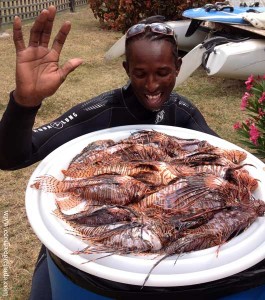
Our People – the Grenada Lionfish Project (www.facebook.com/GrenadaLionfish)
The Grenada Lionfish project is a volunteer group aiming to raise awareness about the 2011 invasion of Caribbean Lionfish. The group started by Christine was inially funded on a micro grant from the Coral Reef Alliance which helped to kick start the awareness effort with banners, stickers, flyers, posters and wrist bands that are sold on a donation basis to help fund ongoing awareness activities and events. The group has hosted over a dozen public cook outs, information events, TV presentations, kids school projects and public awarenss activities. With an endless list of opportunities to promote the cause and a growing list of interested persons, companies and institutions and restaurants (yuppie!!) there are sure to be many events to come.
Of the past and current supporters the Grenada Lionfish Project would like to thank:
Coral Reef Alliance for their financial support and leadership during the group launch
Flow CC Chanel 6 for featuring the efforts and events on numerous occasions
Fisheries Department for supporting all of the efforts of the Grenada Lionfish project
Mmolinere Beausejour Marine Protected Area wardens for their support
Grenada Scuba Diving Association for their support in culling and educatingGrenada Billfish Tournament for allowing us to present the Lionfish at last years event for awareness
First Choice Primary School for having a group of CPEA exam students studying the Lionfish and helping to spread the word
Umbrellas beach bar for always being ready to prepare, cook, present & participate in our Lionfish events on Grand Anse
Anyone and everyone who supports our cause and efforts!
And a huge thank you to the fishermen to come who will commit to this and make a good living selling this delicious fish as a delicacy to our restaurants …
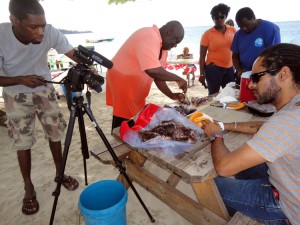
Dive Site – Red Buoy
Dive profile 7m/22′- 25m/85′
This dive site named for its location on the red buoy on the outside of the deep water harbour is a site used by our more experienced or more adventurous divers looking for treasure. With the top of the reef starting on a shallow plateau around 25 feet and the channel drop off to the north we have a range or marine reef habitat dispersed over the area and a range of historical artifacts like the anchors of the Bianca C that were cut loose when she was burning and other large vessel anchors, old plates, telephones, bottles etc. Being in the harbor entrance the visibility can vary widely adding intrigue to the murky drop off over the reef ledges, or, provide an excellent view of the natural bathymetry entering the bay. This site is not dived by shops as often as some of our more consistent locations however it can still provide a lovely dive especially for our repeat guests looking for something a little different. The invasive Lionfish which are unfortunately all around Grenada have also made themselves comfortable here making this a good drop point on culling days for our hunting divers.
